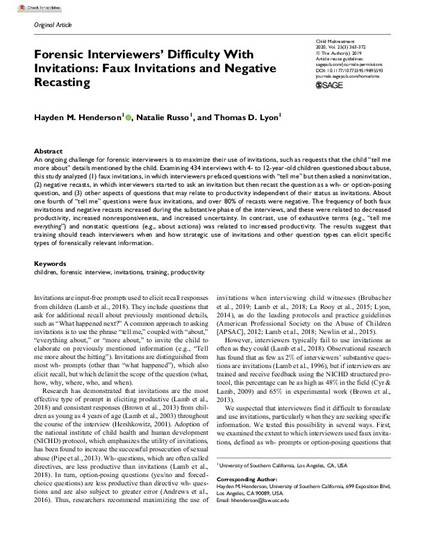
Article
73. Forensic interviewers’ difficulty with invitations: Faux invitations and negative recasting.
Child Maltreatment (Published 2020)
(2019)
Abstract
An ongoing challenge for forensic interviewers is to maximize their use of invitations, such as requests that the child “tell me more about” details mentioned by the child. Examining 434 interviews with 4- to 12-year-old children questioned about abuse, this study analyzed (1) faux invitations, in which interviewers prefaced questions with “tell me” but then asked a non-invitation, (2) negative recasts, in which interviewers started to ask an invitation but then recast the question as a wh- or option-posing question and (3) other aspects of questions that may relate to productivity independent of their status as invitations. About one fourth of “tell me” questions were faux invitations and over 80% of recasts were negative. The frequency of both faux invitations and negative recasts increased during the substantive phase of the interviews, and these were related to decreased productivity, increased non-responsiveness, and increased uncertainty. In contrast, use of exhaustive terms (e.g., “tell me everything”) and non-static questions (e.g., about actions) were related to increased productivity. The results suggest that training should teach interviewers when and how strategic use of invitations and other question-types can elicit specific types of forensically relevant information.
Keywords
- forensic interviews,
- child testimony,
- child abuse,
- child sexual abuse
Disciplines
Publication Date
Winter December 2, 2019
Citation Information
Henderson, H.M., Russo, N., & Lyon, T.D. (2020). Forensic interviewers’ difficulty with invitations: Faux invitations and negative recasting. Child Maltreatment, 25, 363-372.
